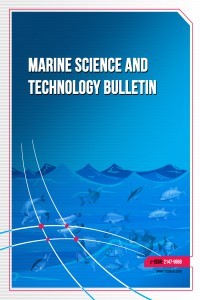
Marine Science and Technology Bulletin
Yazarlar: Latife Ceyda İRKİN, Şamil ÖZTÜRK
Konular:Gıda Bilimi ve Teknolojisi, Balıkçılık, Biyoloji, Hücre Biyolojisi
DOI:10.33714/masteb.887428
Anahtar Kelimeler:Gastritis,Heavy metal,Stomach,Cross-cut carpet shell,Ruditapes decussatus
Özet: Ruditapes decussatus (Linnaeus, 1758) belongs to the Veneridae family is given as nutrients to rats. R. decussatus was collected from three different locations from the Çanakkale Strait. Twenty-four male Wistar Albino rats (270-310 g) were used in the study. There were six rats for each experimental group. The first group fed with standard rat feed, the second group fed with 80% R. decussatus + 20% standard rat feed daily; the third group fed with 80% R. decussatus + 20% standard rat feed every other day, the fourth group fed with 80% R. decussatus + 80% standard rat feed every three days. After routine histopathological follow-up, gastric tissue samples of all subjects were stained and examined under the light microscope. There were no histopathological findings in the gastric tissues of rats in the control group of hematoxylin-eosin staining. In gastric tissues of rats fed with R. decussatus, chronic gastritis caused by mononuclear inflammation between lamina propria and occasional gastric glands was noted. It was observed that inflammation severity and distribution were high especially in tissues of rats fed with R. decussatus every day. It was observed that the most commonly consumed shellfish may cause pathological picture on the digestive system of rats. As a result, increasing environmental pollution threatens the life of water as well as land life, and the consumption of living organisms exposed to polluted environments continues to threaten and affect human life. It is important to pay attention to the conditions under which the consumed products are collected and how they are collected.